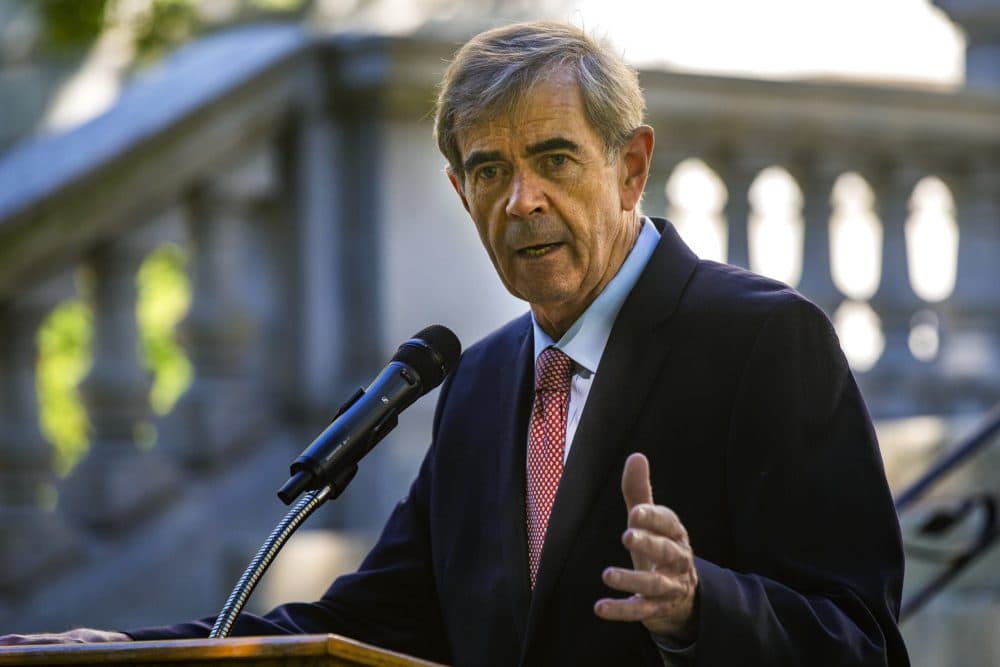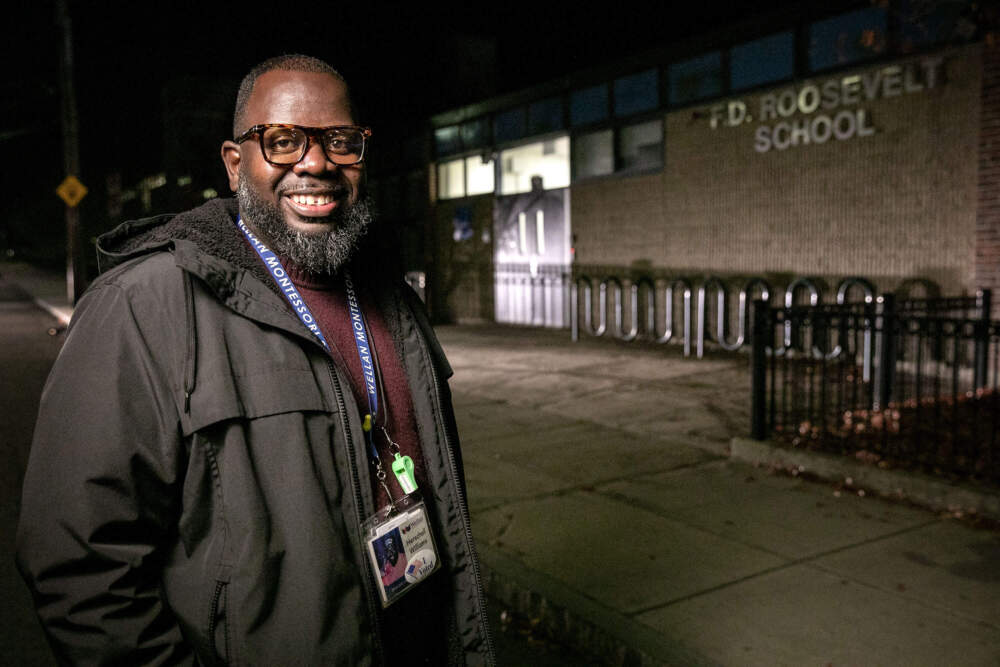Advertisement
At least 14 Boston precincts ran out of ballots in November election, WBUR analysis finds

Herschell Williams, a teacher, arrived at his polling place in Hyde Park after work on Election Day to find about 15 people in line ahead of him to vote at the Roosevelt K-8 Upper Campus. It was 5:30 p.m. and the precinct was out of ballots.
A poll worker said a police escort was on the way from City Hall with more ballots, but no one knew how long that could take. During the wait, Williams said, the line of voters grew, stretching out the school’s front doors and winding halfway down the block.
“They were very apologetic and were like, ‘It's out of our hands',” Williams said.
A WBUR analysis of complaints and records found that at least 14 precincts across the city of Boston ran out of ballots at some point during Election Day this November — more than officials have previously disclosed.
These shortages took place in neighborhoods from Charlestown to Roslindale, and not because of a state failure to print ballots. Many sat in stacks, undelivered to voting places by the city’s election department, according to Secretary of State William Galvin.
Galvin is investigating why precincts ran out of ballots, and the city has launched a probe as well. The Boston City Council is scheduled to hold a hearing at 2 p.m. Friday on the ballot problems.
Election Day in Boston
Of all the impacted neighborhoods, Hyde Park, one of the most racially diverse areas of the city, saw the most issues. Five out of its 13 precincts logged complaints about ballot shortages. Poll workers at one neighborhood polling station complained they ran out by 11 a.m., according to emails from the secretary of state’s office.
Even more frustrating, those emails show poll workers reported that their urgent calls to the Boston Election Department went unanswered. Confused and angry voters reached out on the city’s public complaint app for help.
“Ward 19, precinct 5 is out of ballots at 5:20pm! When are they coming??!!” one constituent in Jamaica Plain wrote to 311.
Precincts in Charlestown, Dorchester, Hyde Park, Jamaica Plain, Roslindale, the South End and West Roxbury ran out of ballots, according to complaints compiled by WBUR from interviews with elected officials, election integrity advocates and voters, as well as public records.
Advertisement
Additional ballots arrived at polling places only after Galvin said his office ordered police escorts to deliver them with lights and sirens activated to navigate rush hour traffic.
These failings run afoul of state law, according to Galvin. Election departments must deliver enough ballots for all of a precinct’s registered voters, although it does not specify by when.
“This was not done deliberately,” Galvin said at a press conference after the election. “It was incompetence.”
Details of precisely how the city failed to deliver sufficient ballots to polling places have yet to be disclosed. Boston Mayor Michelle Wu has said an initial review by the city pointed to a problem with a formula used to schedule ballot deliveries.
This is not the first time Boston precincts have run out of ballots. It’s déjà vu for Galvin, who’s been secretary of state since the 1990s. Back in 2006, amid a series of similar failures in Boston, his office took over the city’s election department for two years.

The 2006 meltdown
A hotly contested, historic governor’s race brought a crush of voters to the polls in 2006, ultimately electing Deval Patrick as the first Black chief executive of Massachusetts. Turnout was at least 20% higher than in more typical off-year elections, according to a report by Harvard University elections expert David King.
Even before the election, the agency showed signs of poor management. It was under federal scrutiny for allegations that it violated the Voting Rights Act by failing to provide proper support for voters with limited English.
Years of low staffing and underfunding hobbled the department, despite new federal requirements that increased its workload, according to King, who declined to comment for this story. Office phones were outdated. Lists of city residents were inaccurate. Oversight was non-existent. The election commission “essentially ceased to function as an independent oversight body,” the report found.
Together, these problems set the stage for an Election Day meltdown. Much like this year, poll workers in 2006 tried to warn the election department that ballots were running low, but their phone calls didn’t get through, according to the King report. Some precincts received too many ballots. And when the evening rush hour arrived, ballot deliveries got stuck in traffic.
The result: 38 of the city’s polling locations ran out of ballots, in part because of understaffing and poor oversight, King reported.
Avi Green, who was head of a statewide voting rights group in 2006, said there are lessons to be learned from the city’s experience nearly 20 years ago.
“The question for elected officials and election administrators is how do we figure out exactly what went wrong?” said Green, who now consults for nonprofits and government entities. “And then how do we report on that to the public and explain what happened, what we've learned and what we're going to do?”
He suggests the current administration may have forgotten this prior experience. “When you don't remember the problems of the past, I think the famous phrase is, ‘you're doomed to repeat them,’ ” Green said.
Solving the problems of 2006 required more funding and staffing increases, Green noted.
Exercising the right to vote
As Election Day 2024 approached, the secretary of state’s office alerted election departments statewide that turnout might be high, and reminded them to stock precincts with enough ballots for each registered voter, according to a memo dated Nov. 4.
The state sent Boston more than enough ballots to fulfill its requirement, Galvin said in a letter to the city’s election commissioner after the election. But the city’s election department did not send all of them to the polls, and was not prepared to restock them quickly.
Williams, the Hyde Park voter, was about two hours into his wait when he heard the sound of cheering from outside. Police pushed through the precinct’s doors with the ballots and voters burst into applause.
“It was a joyful thing,” Williams said. “And then after that, it took every bit of five minutes for me to vote and get out.”

Other voters may not have stuck around. Poll workers were instructed by the city to collect phone numbers so voters who didn’t want to wait could be contacted once the ballots arrived. But complaints to Boston’s 311 line and the secretary of state’s office said poll workers turned voters away at Jamaica Plain and West Roxbury precincts.
The city of Boston issued an apology on election night and praised the “diligent efforts” of poll workers to “ensure that every voter can exercise their right to vote.”
Wu and city election officials did not comment for this story.
City Council President Ruthzee Louijeune said she wants to hear more about the Election Day complications so the city can prevent ballot shortages in the future at the hearing scheduled for Friday.
“We have to figure out how we do a better job of administering elections, especially in a presidential year,” Louijeune said, whether it's a question of staff resources or communication.
City Councilor Enrique Pepén, who represents impacted parts of Hyde Park and Roslindale, as well as portions of Mattapan, said the city needs to rebuild confidence in its elections.
“Of course it impacts the trust in the process,” Pepén said. “You want to make sure that when you put yourself in that line, you know you're going to go there to vote.”
With reporting from WBUR’s Todd Wallack
This segment aired on December 5, 2024.

